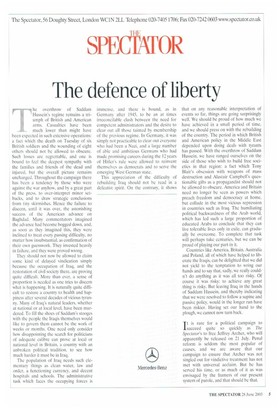The defence of liberty
The overthrow of Saddam Hussein's regime remains a triumph of British and American arms. Casualties have been
. _ much lower than might have been expected in such extensive operations: a fact which the death on Tuesday of six British soldiers and the wounding of eight others should not be allowed to obscure. Such losses are regrettable, and one is bound to feel the deepest sympathy with the families and friends of the dead and injured, but the overall picture remains unchanged. Throughout the campaign there has been a tendency by those who were against the war anyhow, and by a great part of the press, to over-interpret minor setbacks, and to draw strategic conclusions from tiny skirmishes. Hence the failure to discern, until it was over, the astonishing success of the American advance on Baghdad. Many commentators imagined the advance had become bogged down, and, as soon as they imagined this, they were inclined to treat every passing difficulty, no matter how insubstantial, as confirmation of their own guesswork. They invested heavily in failure, and they were proved wrong.
They should not now be allowed to claim some kind of delayed vindication simply because the occupation of Iraq, and the restoration of civil society there, are proving quite difficult. More than ever, a sense of proportion is needed as one tries to discern what is happening. It is naturally quite difficult to restore a country to health and happiness after several decades of vicious tyranny. Many of Iraq's natural leaders, whether at national or at local level, have been murdered. To fill the shoes of Saddam's stooges with the people the Iraqis themselves would like to govern them cannot be the work of weeks or months. One need only consider how disappointing the search for politicians of adequate calibre can prove at local or national level in Britain, a country with an unbroken political tradition, to see how much harder it must be in Iraq.
The population of Iraq needs such elementary things as clean water, law and order, a functioning currency, and decent hospitals and schools, The administrative task which faces the occupying forces is
immense, and there is bound, as in Germany after 1945, to be an at times irreconcilable clash between the need for competent administrators and the desire to clear out all those tainted by membership of the previous regime. In Germany, it was simply not practicable to clear out everyone who had been a Nazi, and a large number of able and ambitious Germans who had made promising careers during the 12 years of Hitler-s rule were allowed to reinvent themselves as democrats and to serve the emerging West German state.
This appreciation of the difficulty of rebuilding Iraq should not be read in a defeatist spirit. On the contrary, it shows that on any reasonable interpretation of events so far, things are going surprisingly well. We should be proud of how much we have achieved in a small period of time, and we should press on with the rebuilding of the country. The period in which British and American policy in the Middle East depended upon doing deals with tyrants has passed. With the overthrow of Saddam Hussein, we have ranged ourselves on the side of those who wish to build free societies in that region: a fact which Tony Blair's obsession with weapons of mass destruction and Alastair Campbell's questionable gifts as a propagandist should not be allowed to obscure. America and Britain need no longer be seen as powers which preach freedom and democracy at home, but collude in the most vicious repression in countries such as Iraq. The humiliating political backwardness of the Arab world, which has led such a large proportion of educated Arabs to conclude that they can live tolerable lives only in exile, can gradually be overcome. To complete that task will perhaps take centuries, but we can be proud of playing our part in it.
Countries like America, Britain, Australia and Poland, all of which have helped to liberate the Iraqis, can be delighted that we did not yield to the temptation to wring our hands and to say that, sadly, we really couldn't do anything as it was all too risky. Of course it was risky: to achieve any great thing is risky. But leaving Iraq in the hands of Saddam Hussein, and thereby indicating that we were resolved to follow a supine and passive policy, would in the longer run have been riskier. Having set our hand to the plough, we cannot now turn back.
It is rare for a political campaign to succeed quite so quickly as The Spectator's to free Jeffrey Archer, who will apparently be released on 21 July. Penal reform is seldom the most popular of causes, and we are aware that our campaign to ensure that Archer was not singled out for vindictive treatment has not met with universal acclaim. But he has served his time, or as much of it as was envisaged by the framers of our present system of parole, and that should be that.


































































 Previous page
Previous page